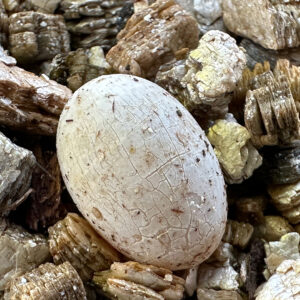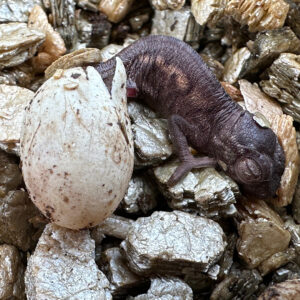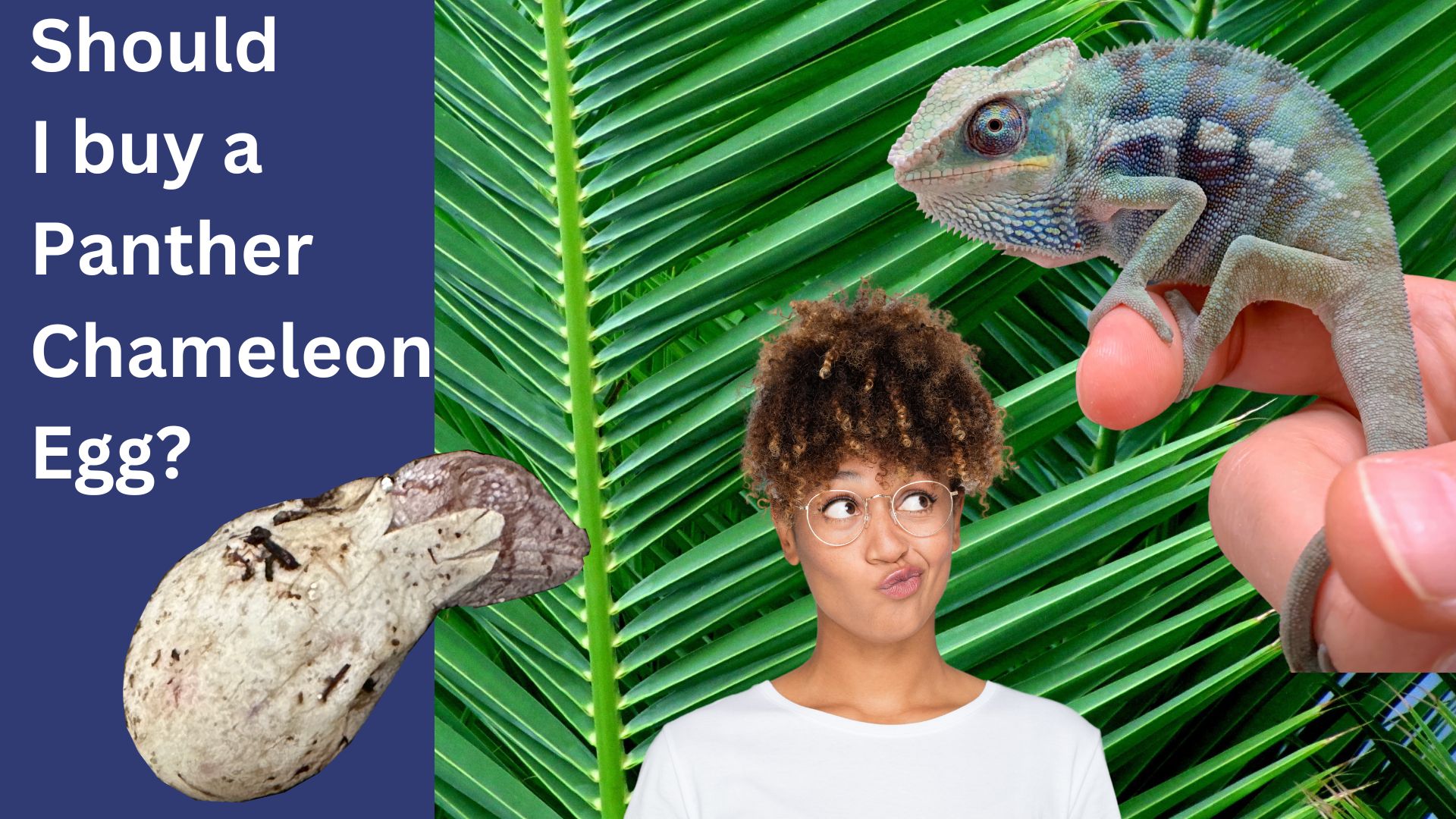Should I Buy a Panther Chameleon Egg or Juvenile?
Should I get a chameleon egg? Buying an egg has been a quiet option for many years and you might run into this opportunity. Does it sound exciting to hatch an egg? It might pique your interest, but there are a number of things to consider. Today I will lay out the pros and cons so you can make an informed decision.
Listen to this episode!

Should I get a Chameleon egg?
Panther chameleons are the most widely bred chameleon and you will be able to find them sold in every life stage. Last episode we talked about getting them as wild caught adults. Today we are going to go to the complete opposite end of the lifecycle. Either online or at reptile shows, you may run into someone who is selling panther chameleon eggs.
Now, I feel I need to give a context of which this episode is coming to you. The selling of eggs is controversial. Breeders expend enormous effort and expense to raise up hatchlings to an age where they are well started to give you the best experience. Sending you an egg bypasses all that effort and puts all the risk on your shoulders. While someone experienced in chameleons might be willing to take that on, the problem is when people are enticed to get a chameleon egg as their first chameleon experience. The chances of it going badly are much greater. Now, before you start wondering if there is a conspiracy going on, allow me to share that if any of these breeders who are against egg sales decided to switch to egg sales their profits would shoot up over night. So this isn’t a case of greedy breeders protecting their business interests. So, is starting with an egg really a cheaper, easier, or more exciting way to get into chameleons? Or is it setting you up for hidden costs and risks? The best approach is to lay it all out for you so you can gauge the risk/benefit analysis yourself. Now, you will notice I have not given my personal opinion. I’ll save that for the end once I have provided you with the information necessary for us to have a meaningful conversation. If you want the short answer you have heard me recommend getting a well started captive hatched juvenile from a reputable breeder quite a few times before so you have a preview. But my approach to chameleon herpetoculture is to inform you enough that you are able make your own educated decisions. We’ll talk more at the end of this episode.
So, this is how it will work. In this episode I will talk to the people who are considering purchasing an egg. I am going to lay it all out for you so you can make an informed decision. But, even if you do have an egg already, this episode will be valuable for you to understand the swirling of opinions, feelings, and frustrations you might encounter when stepping into social media.
You may or may not have noticed that the selling of eggs is a subject that can get spirited in the community and if you go on social media talking about the egg you are waiting to hatch you may get, what may seem to you, an overly passionate, response. The frustration is not directed at you, personally, but it would be hard not to feel it, none the less.

The Pros and Cons of buying a Panther Chameleon Egg
Let’s go over some considerations in purchasing an egg.
The first thing to consider is that incubating an egg puts you in the position where you are learning about how to take care of chameleons at their absolute most sensitive point in life. Considering how many people have problems with juveniles and even adults, hatchlings deserve some scrutiny.
This is a good time to explore how we in the community got to the point where we collectively decided when a baby panther chameleon was ready to go to a new home. Through trial and error we came up with the age of three months old. This got the hatchling up to the point where it was stable and passed the most difficult time in their development.
Though I need to note that age is actually a weak measurement of suitability to go to a new home because there is a wide range of sizes that the chameleon can grow to in that time depending on the husbandry. A guideline of at least 12 grams is a reasonable weight for going to a new home, though, through individual raising I have reports up to 23 grams can be obtained in three months. The thing is that when breeders cut corners and sell babies that are too young, or small, they are viewed as unethical because they are bypassing the protective measures that give our breeding community a good reputation. So it is a strange thing to see an egg sale, where the buyer will most definitely get a hatchling, being seen as a feature. It is true, in the case of an egg purchase, the buyer knows they are getting a hatchling so there is no outright deception on that, but the new-to-chameleons buyer usually does not have the background to know the significance of what they are giving up. And they don’t realize that buying an egg means the transaction has been stripped of all the protections the breeder community has put in place to make the experience as successful as possible for the new chameleon keeper! When you tap into the community, this is why there is such a controversy over egg sales. Protections are being removed for the exact people the protections were put in place for!
So this is why there is significant push back on the sale of eggs. Eggs have been exchanged between experienced breeders. So the experienced community is aware of what it takes to do this successfully as well as the risks due to transportation and incubation. The debate here, at least in my mind, really boils down to whether this should be considered a beginner activity.
So, let’s get into an objective pros and cons discussion to help you make a decision.

Are There Good Reasons to Buy a Panther Chameleon Egg?
For this we can go through the standard marketing benefits proposed and evaluate each one of them.
The marketing benefits are usually presented as buying an egg is cheaper, it gives the impulse buyer time to research and get the right equipment, and it is an educational experience to raise one from hatching.
Is Buying a Panther Chameleon Egg Cheaper?
Saying that it is cheaper to buy an egg leaves out the cost to raise the baby to three or so months old.
While the immediate upfront cost is lower in monetary terms, anyone who has fed a chameleon until they are of a size to go to a new home realizes it isn’t cheap. Yes, you can certainly cut down on costs by being a sophisticated keeper. You can raise all your own feeder insects. But if you are doing this then you have a level of experience beyond the beginning keeper. My main concern is when beginners start down this road. Beginners will not have breeding colonies of feeder insects ready and waiting. So, before you say it is cheaper to buy an egg and raise it up, you have to consider if it is truly cheaper than hiring a deeply experienced chameleon breeder to hatch out the egg and feed it with economies of scale and deliver to you what it would take three to six months of your own effort and expense.
If you are okay with spending more in the end if it is spread out over six months then you will also have to ask what you are giving up to get that initial savings in money. Remember all those protections that the breeder took on to be able to provide you with a well started juvenile? That is all lost in the couple hundred dollars you saved. The question is whether that truly is a good trade.
In addition, considering how expensive the equipment to properly care for a chameleon is, starting off by valuing dollar savings above all the safety measures built into working with a breeder, raises a red flag. And I see this first hand year after year. People who are looking for deals tend to take that attitude with everything else. When I vend at shows you can always count on the last hour of the show being filled with people who bought their baby veiled chameleon for a blow out price because the breeder didn’t want to go home with them. And these bargain buyers are grabbing the cheapest cages and only the minimum equipment because, and I quote, “I am not going to pay more for the cage than I did the chameleon”. I would be concerned if a choice to buy an egg was made from a short sighted financial decision.
If you are wondering why I am getting so into the weeds on this, well, if we are going to explore the financial argument about this direction then we need to be thorough in our reasoning. I, personally, cringe when I hear people making panther chameleon buying decisions based on price. And this goes for any aspect. It is the same when someone decides to buy a panther from a pet store without a lineage because it is cheaper. Or decides to go with the discount online retailer vs a breeder to save a couple hundred dollars. It is the same purchasing an egg over a well-started juvenile. Getting the best financial deal when purchasing live chameleons is the wrong way to make decisions. The quality of animal and type of experience you will have tracks price pretty closely in the chameleon community.
In summary, reduced upfront cost is a pro on the surface, but when we look into it, that benefit is balanced by possibly spending more in the short term and taking on all the risks of raising up a hatchling.
Does Buying a Panther Chameleon Egg Give You Time to Research?
I mentioned the pro that buying an egg gives the buyer time to research and put together a proper set-up. This is a benefit only for the person who is new to the community and it is a surprise benefit because they, by definition, did not do much, if any, research. But you are listening to this and so this is not relevant for you. You are making an informed decision and so you know that you will be able to purchase a well started juvenile or even an egg at any time you feel you are ready. I, as an educator, appreciate the time between impulse purchase and actually having a chameleon to care for because it gives impulse buyers time to prepare that they wouldn’t have if they purchased a juvenile. But this is comparing two undesirables. Impulse buys aren’t a good thing to encourage. Sure, with an egg you have a couple months to research, but what if you find out that chameleons just aren’t the fun pet you saw in the Disney movies? That is the kind of thing you want to know before you get involved with chameleons in any form!
We are lucky to live at a time where captive hatch panther chameleons are readily and constantly available.So there is no window of opportunity you have to rush to get in. Do the research until you are comfortable with what a chameleons is and needs.
Is Starting with a Panther Chameleon Egg Good for Experience?
One reason to buy an egg, that I feel is a legitimate reason, is that you specifically want the egg hatching and hatchling raising experience. If you want to experience the entire lifecycle of a chameleon then this is a good way to start. Breeding your own chameleon and having 30 babies to deal with is like jumping into the deep end for your first experience with babies! But I am going to suggest that you don’t take on the hatchling raising experience until you are experienced raising up a juvenile chameleon. It is a great first step and you learn so much that reading and watching videos can’t make real. You know how everything takes on a whole different meaning once you do it even though it was explained before. Raising a hatchling is a wonderful experience. It makes an incredible memory. But it can be a nightmare experience and a heartbreaking memory if you do it wrong. I love raising hatchlings, and you can see some times in the past where I made tutorials on how to raise hatchlings before. Yet, I am going to say that it is worth it to have solid husbandry experience before you take on that challenge. And I encourage you to approach your milestones in keeping chameleons patiently.

What are the drawbacks of buying a panther chameleon egg?
In a way I feel bad as I am suppose to be presenting this in an objective manner and my pros list had all sorts of caveats, clarifications, and wasn’t very positive at all. And now I have a cons list. Really, this cons list is just the risks that the breeder takes on for you and protects you from dealing with. We mentioned that in passing so let’s dig into it a bit more.
The Panther Chameleon egg may not hatch
Panther chameleon eggs aren’t that hard to incubate, but eggs not hatching are a common complaint. As easy as it is to get eggs laid and then put them in a cool closet for six to nine months sounds, packaging the eggs separately, transporting them to a show or through the mail, and then finishing incubation in an area that has unknown temperature swings adds a while lot of variables to the mix. Even experienced breeders do not always get 100% hatch rate. If yours goes 14 months and then molds over then that was all for nothing.
The risk of the egg not hatching is a con, though, another problem is the egg hatching, but the hatchling coming out weak.
The Panther Chameleon may hatch out weak
Hatchling health upon hatching is usually pretty good and, much of the time, hatching goes off without a hitch. But there are some eggs which just are not 100%. This could be from when they were being formed to issues in incubation. And when the eggs are transported you introduce a plethora of uncontrolled and unknown variables. If there is a problem you won’t be able to tell that there will be an issue or what caused it. The hatchling may cut the egg open, but never emerge. Or it could crawl out, but not thrive and die in a couple days or few weeks. The reasons for this are many and only a few of them are under your control. Once again even experienced breeders have this happen.
You cannot pick the gender of your Panther Chameleon
Perhaps the biggest issue with hatching an egg is not knowing what sex you will get. With Panther Chameleons you made your selection based on the brightly colored male shown as the father, right? Well, how would you feel if you got a female? For those new to chameleons, the female panther chameleon is a spectacular animal in her own right with pinks and oranges, blacks and grays. But females are not usually appreciated as much as they deserve because of the distraction of the male that shows an amazing array of bright, almost unnatural colors. And, of course, it was the color show that pushed you over the edge to purchase the egg,. I haven’t seen any panther chameleon egg advertising that sells off of the female coloration!
So you have to be honest with yourself because chameleons are, if we do it right, a 5 to 7 year commitment. If you have always dreamed of a male panther chameleon and would be disappointed to get a female then get a well started baby so you can see the colors coming in and you know you will be happy. Don’t get an egg hoping for a male. That is not fair to the female that may come out.
Now, may I say that the female panther chameleon is one of the most underrated chameleon pets? I love them deeply. I actually have more non-breeding female panther chameleons as pets right now than I do males. The orange and pinks with blue undertones or red overtones are gorgeous. Their smaller size makes the standard 2x2x4 cages a much bigger cage experience which makes it more enjoyable for us, in my opinion. So, when I have panther chameleon eggs hatch I am equally happy whether it is a male or female. I don’t even bother sexing them until months later when I am getting ready to sell them. The panther chameleon species is just an incredible chameleon all around. But you need to dig deep and be honest about your feelings. Make sure you are of the mindset that you will enjoy the chameleon experience either way. And for the people who are buying three eggs just to make sure they get a male…I suggest just getting the well started juvenile male. I know having one chameleon hatch is exciting so three should be three times exciting, but that just means you need three cages. And that is important. Make sure you have as many full set-ups running and ready to be lived in as you have eggs. A rule in chameleon keeping that is black and white is that chameleons should not be kept together. I acknowledge this is a corner that many breeders cut, but that is the old way of doing things. And it is not a good way of doing things. Don’t hang on to the past. Keep your hatchling chameleons in separate cages.
You are learning Panther Chameleon husbandry on the most sensitive life stage
Finally, if this is your first chameleon then you will be learning chameleon husbandry on a chameleon at the most sensitive point in a chameleon’s life. The problem is that there are no second chances with a hatchling. With a juvenile you get a warning sign that something is up. Maybe they are lethargic and they start closing their eyes. If you are observant you may be able to catch it in time to change something and bring them back out of it. With a hatchling, by time you notice something is off, it often is too late to turn it around. I am sure it surprises no one that babies are not as resilient as adults and not forgiving of missteps.

My Personal Feelings on Panther Chameleon Egg Sales
Now, it is only fair that I share my personal feelings about egg sales and why I am doing this outreach. You ought to know where I am coming from! I love hatching chameleons and raising them up. It is one of my greatest joys. And I would love for others to be able to experience that. I am not as concerned about the shipping of eggs as I know they ship and hatch if the shipping is done right. And I would rather an egg be shipped than a live chameleon. Yes, they fall asleep in the dark of the box, but that is still quite the bumpy night. And if anything unexpected happens I would rather that happen to an egg than a juvenile chameleon. My huge concern is that eggs are being sold as a cheaper alternative to well-started juvenile chameleons and that encourages the money saving part of us. And the deferred worry part of us. Hey, I’ll buy three eggs and worry about the set-ups later. Do you really want three chameleons? Would you buy three chameleons if they were juveniles? And if you are buying an egg to save money, are you willing to spend the money it takes for two set-ups – a hatchling grow-out and adult cage? My concern is with the motivation for getting an egg and if that is good for the chameleon. We humans trend to like immediate gratification and put off worrying about how we deal with our decisions until later
So, you might be able to see the tightrope I am walking here. My mission is to educate, but I do not want to make it seem so easy that people take on something they are not truly prepared to jump into.
When I get messages from people saying they got an egg and they want to know the best way to prepare for hatching and are gung ho to get exactly what they need I relax and think maybe this isn’t so bad. Maybe I am providing a valuable educational service here? And then I get the messages that read something like, “Hey, I noticed you might know something about chameleons. I had my egg hatch, what do I do?” and I get this feeling like I do not want to be anywhere near seen as encouraging this. So, I have decided I will share care for all stages of life and if you are the type who is dedicated enough that you will search out this show and listen to it then you are the type of person I want to encourage and help you be successful.
If you had already purchased one before listening to this then I want you to be successful and I intend to be sharing resources and techniques through this podcast that will help you. But I ask that you be honest with your experience and let others know the challenges you encountered. When you go on social media it might have the feel that you have to take sides and defend yourself. I go through great lengths to try and have a positive and objective atmosphere here. I am human and I don’t always succeed, but I strive for it! If you consider this your home base for your chameleon world knowledge then I encourage you to try and keep that mindset when you are out in the wilds of social media. Share both the success and the challenges.
And, for those of you still making a decision, if you want it simple from my view, my advice is to get a well started captive hatched juvenile panther chameleon from a reputable breeder.
If you want to make your own decision, either way, then I have laid it all out in this episode. Whichever direction you go in, you will go educated and able to make the decision that is right for you.
A Breeder's Perspective on Buying a Panther Chameleon egg
You may or may not have run into the fact that egg sales are a controversial practice in the chameleon community. If you are in the decision making phase then it is worth listening to each side. In the episode embedded below I interview Jonathan Hill who is the founder of iPardalis, which provides high end panther chameleons as well-started juveniles. He could, at any point, start selling eggs. Considering how much easier that is, as far as running a business, it is valuable for us to get his perspective as to why he specifically made the choice to sell juveniles and not sell eggs.
Your next step with Panther Chameleons!
This page is a module in a self-guided, multi-media course on the care of a Panther Chameleon hatchling. I you are finding this course through this module you can go to the home page and learn more about the outreach. This course is designed to be studied chronologically to start at episode 1. You may go to the home page to learn more about the course and find episode 1 or go on to the next module with the links below.








